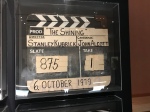I hopped into a Mrs Thatcher themed Tardis the other week when my monthly Thursday theatre treat took me back to the Tory Britain of the 1980’s.
A sold out Hansard, written by Simon Woods, and starring stage stalwarts Lyndsay Duncan and Alex Jennings, was brilliantly beamed live into Canton’s Chapter Arts from London’s National Theatre
The play, set in 1988, centred around the return of Westminster-based Tory MP Robin Hesketh to both his idyllic Cotswold home – and his acerbically witty left-wing wife Diana.
There then follows a battle of wills as the long-suffering couple often funnily, occasionally spitefully, and sometimes movingly, bicker with each other about their married life, their widely different political views.
And, as not revealed until the very end, their shared grief of tragically losing their son to suicide.
All this is played out in the exact week of that infamous Local Government Act which expressly forbade any local authority from promoting homosexuality.
Margaret Thatcher’s controversial Section 28 scarred the schooling of a whole generation of queer people – with its reverberations still felt by of many middle aged men and women today.
Following a 1986 Act that pushed for the same agenda, the first homophobic law for well over a century, effectively meant that no teacher could ever discuss, never mind promote, anything other than heterosexuality to their pupils.
Outrageously, the real possibility that some students might actually be attracted to the same sex, and struggling with their feelings around this, was dismissed and demonised.
Councils were also forbidden from stocking any sort of lesbian and gay materials in their educational establishments, libraries, and other public buildings.
This left scores of school children feeling lonely, isolated and devoid of any sense of belonging due to their ‘State-decided’ difference.
The then Prime Minister’s absolute assertion that children educated about homosexuality were ‘being cheated of a sound start in life,” saw queer youngsters, myself included, desperately looking for some sort of support, information, and advice.
At best this saw us ‘lucky’ ones with the scary option of tentatively confiding in family and friends, seeking solace in the books we could find, or through the many androgynous pop stars of the time – thank you Boy George!
But at worst, Section 28 left lots of LGBT+ youth in the closet with nowhere to go and no one left to turn to resulting in more marginalisation – and sometimes even suicide.
Young queer people of that time, especially gay men, were also not only feeling the pain of prejudice, but also had to battle against the growing media hysteria around the AIDS/HIV crisis.
Peaking in the mid to late 80’s as the doom and gloom tombstone television adverts played on our screens, this saw a nation fuelled by fear and led to a marked increase in homophobia and homophobic incidents at the time.
Jesus wept, no wonder the hurt and anger caused by controversial Section 28 is still felt by some almost as sharply as it was all those years ago, with a generation, quite rightly in my view, never able to forgive and forget.
The clause was repealed in Scotland in 2001, and in the rest of the United Kingdom in 2003, with the Conservative Prime Minister of that time David Cameron finally apologising in 2009.
But step swiftly back into Hansard and we certainly see the exposure of the homophobic climate of the time which is dissected, discussed and dramatized throughout the short but sweet play.
From the off, Diana is a very vocal advocate of gay rights, which is obvious as we slowly and surely learn about her world view.
But her passionate feelings become even more poignant when we realise that the son she lost to suicide all those summers ago was a young man struggling with his sexuality who she stumbled across dressed in her clothes one afternoon.
Revealing this to Robin, the married couple come back together with tears, tenderness, and a shared understanding of society’s influence, to unite in their love for their lost boy.
Hansard certainly hit that home for me.
Speak soon.
Mrs SVJ


Sue Vincent-Jones, writing as Mrs SVJ, is a Barry born journalist, editor, and communications specialist. She blogs about Barry – and her life in the wider world, through the eyes of a, quirky and queer, local girl done good.

Gig Girl Reviews is where she shows that the world is wider than just our town by writing about the gigs, the films, the theatre, the exhibitions, and all things arty – all through the eyes of a local girl done good.

This blog is also featured in Queer News where Sue writes about her LGBT life – the happy times, and the hot issues. This includes all the volunteer work she does in the queer community, and her role as a founding member of LGBTQymru.

Mrs SVJ, Barry’s Boldest Blogger, can be contacted here.
